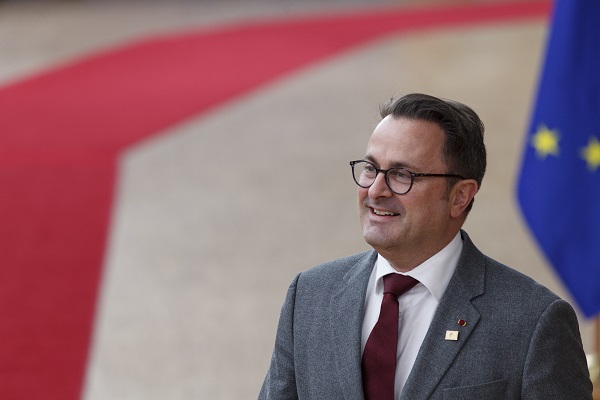 Xavier Bettel, Prime Minister of Luxembourg;
Credit: SIP/Thierry Monasse
Xavier Bettel, Prime Minister of Luxembourg;
Credit: SIP/Thierry Monasse
Luxembourg's Prime Minister Xavier Bettel took part in the European Council in Brussels, Belgium last week.
The meeting between the Heads of State and Government on Thursday 23 March 2023 began with a joint lunch with the Secretary-General of the United Nations (UN), António Guterres. This meeting focused in particular on the most recent developments in Ukraine in the context of the Russian war of aggression, the climate emergency and growing inequalities at the global level. The Secretary-General thanked the European Union (EU) for the support it gives to the UN and for its commitment to multilateralism. Regarding the climate emergency, António Guterres particularly hailed the European Green Deal as a crucial step towards maintaining the 1.5 °C limit.
On the subject of Ukraine, European leaders agreed on the joint purchase of one million units of ammunition by the EU for Ukraine. Regarding accountability and the fight against impunity, the text of the conclusions of the European Council welcomed the agreement on the creation of a new International Centre for Prosecution of the Crime of Aggression against Ukraine, which is considered to crucial for the establishment of an appropriate mechanism (preferably a special international tribunal, as requested by Luxembourg and other Member States).
The leaders' discussions on the European economy focused in particular on competitiveness and the internal market. The conclusions stated that the EU "will ensure its competitiveness by strengthening its resilience and productivity, facilitating financing, aiming at affordable energy, reducing its strategic dependencies, investing in the skills of the future and making its economic, industrial and technological base fit for the green and digital transitions while leaving no one behind."
Regarding the integration of the internal market, Prime Minister Bettel expressed his regret that this anniversary has gone a little under the radar, amid the multiple crises that the EU is navigating. He recalled that the internal market is not yet a reality and that 60% of the barriers identified 20 years ago still persist today. To illustrate this point, the Luxembourg Prime Minister highlighted that it is less complicated for a Canadian architect to establish himself within the EU and to be recognised as such in his profession, than for a European architect wishing to establish themselves in another EU Member State.
The Heads of State and Government also held a strategic discussion on the geopolitical aspects of trade, in which they highlighted the role that trade policy plays in the competitiveness of the EU.
During the debates on energy in Europe, Prime Minister Bettel recalled that "renewable energies are the central pillar of progress towards climate neutrality" and that "they already represent more than 80% of new electricity production capacities each year". He added that nuclear energy was too dangerous, too expensive and comes too late.
The conclusions on the subject of energy specify that the European Council "invites the co-legislators to reach prompt agreement on all relevant proposals to accelerate the green transition, and to take work forward without delay on the proposed revision of the EU's internal electricity market design with a view to ensuring its adoption by the end of 2023."
The meeting between European leaders concluded on Friday 24 March 2023 with a Euro Summit which addressed the challenges and opportunities surrounding the economic and financial situation within the euro area. The conclusions of this meeting emphasised the importance of a resilient European financial architecture to attract sustainable investments, support innovation and job creation and accelerate the green and digital transitions.








